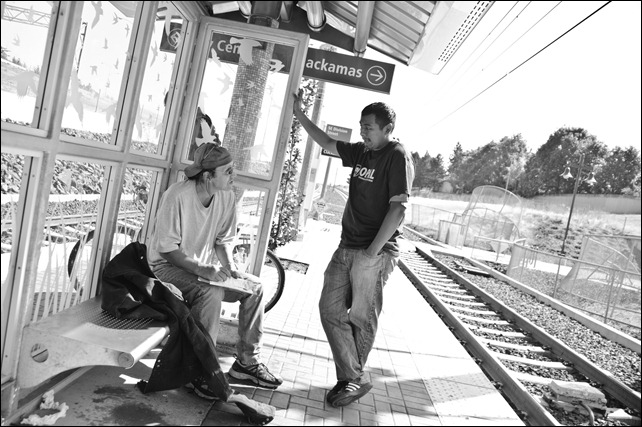
in 2010, gathering support for what became a
successful campaign for longer-lasting transit tickets.
(Photo: Michael Schoenholtz/Portland Afoot)
On March 1, the lifespan of a TriMet ticket will rise 25 percent.
Raising the transfer duration from two hours to two and a half hours is effectively a price cut for anyone who takes round trips on the Portland region’s transit system one ticket at a time — either because they’re only an occasional rider or because they don’t have the cash or fancy job to have a monthly pass.
It’s also the clearest win so far for the five-year-old Bus Riders Unite campaign from local advocacy group OPAL Environmental Justice Oregon. Their “Campaign for a Fair Transfer” emerged from meetings in 2010 that asked East Portland transit riders what changes would make a difference in their lives.
Lower fares, many riders said, and more frequent buses. OPAL has since spent years pushing for both, with mixed success.
But a somewhat smaller idea that emerged from those meetings was the idea of a longer transfer — long enough to get from outer Southeast Portland to a Battle Ground construction worksite. Long enough to take the family to a movie and return without paying twice.
The organization shopped that idea around to potential allies like Chris Smith, a city planning commissioner, transit commentator and Portland Streetcar board member.
“He looked at me and said, that is a fight you could win,” former OPAL organizer Shannon Olive told me in a 2010 interview.
Advertisement
OPAL’s members and organizers agreed. They started riding the bus every week to gather names of riders who wanted to take action. The recruits they found there and elsewhere became the core members of Portland’s most interesting and well-organized group of public transit advocates.
OPAL asked the agency for a universal three-hour ticket, plus all-night lifespans for any ticket purchased after 7 p.m. Over the next few years, TriMet seemed to sometimes dismiss, then favor, then back away from taking action.
Now that rebounding payroll tax income has let TriMet restore most of its service hours and built a new $1.5 billion MAX line — but continued to grapple with stagnant ridership significant drops in public perceptions of its quality — the agency seems willing to start taking risks. One of them, it announced on Wednesday, is extending the life of a transit fare.
TriMet, drawing on an economist’s report that anticipated little change in rider behavior, thinks the agency will lose $1.2 million a year from lost return fares out of its $342 million operating budget. OPAL, drawing on its own estimates with different assumptions about riders’ price sensitivity, disagrees.
“We think that in a matter of a few years it will pay for itself,” Jonathan Ostar, OPAL’s executive director, told the Portland Mercury on Wednesday. “For once we actually saw the board take a risk to the benefit of riders.”
Whatever happens, it looks as if we’ll get to find out.


